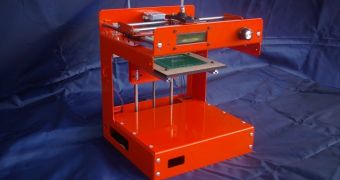The Kickstarter crowd-funding website is hosting some really amazing, cheap 3D printers, but they'll take some time to arrive, and they won't suit the needs of everyone. Thus, the one set up by Peter van der Walt is bound to gather some followers anyway.
When they first came out, 3D printers, like everything else in their infancy, were very, very expensive. Thousands of dollars expensive or more, depending on their size and purpose.
They've been getting better fast, though, and now we're actually looking forward to printers with prices of as little as $139 /€139. True, that's an example of an extreme, but even so, there are others, like €600 /$600 Titanium printer (prints from other metals too).
If you have too much time on your hands, you could even build your own 3D printer from parts worth a mere $75 / €75 if you can believe it.
Still, ultimately, you're likely to get better quality and less of a hassle by acquiring a commercial model. That's where Peter van der Walt's latest invention comes in.
Basically, the man, owner of the OpenHardware company, has designed a 3D printer made from sheets of metal by means of CNC machines and a laser cutter. It's a very sturdy piece of work that can have one of three build sizes.
So we suppose you could say that der Walt made three 3D printers, not just one. The build volumes are 100 x 100 x 100 mm for the Babybot (3.93 x 3.93 x 3.93 inches), 200 x 200 x 200 mm for the medium-size one (7.87 x 7.87 x 7.87 inches) and 200 x 200 x 300 mm for the largest one (7.87 x 7.87 x 11.81 inches).
In that order, the prices are of $500 / €367, $725 / €533 and $900 / €662. Compared to $139 / €102 - €139, that's a lot of money, but perspective is a wonderful thing, and we can, fortunately, provide it here: any 3D printer under $1,000 / €1,000 is considered cheap.
Peter van der Walt will start taking pre-orders for the new 3D printers sometime this month (June 2014) and will ship demo units to South Africa retailers too (Communica). The University of Pretoria will get a batch as well. Later, he may extend availability to the US and UK also, but it's no guarantee. He needs to gauge interest first. Whenever he reaches a decision, he's bound to reveal it on OpenHardware.

 14 DAY TRIAL //
14 DAY TRIAL //